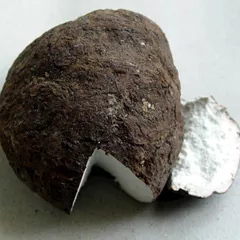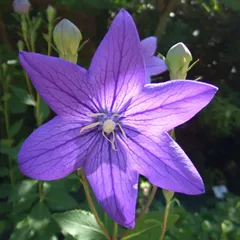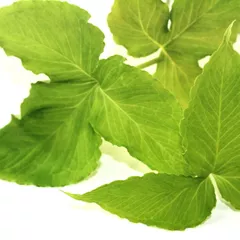Bei Mu Gua Lou San
Chinese: 贝母瓜蒌散
Pinyin: Bèi Mǔ Guā Lóu Sàn
Other names: Fritillary bulbs and Snake gourds Powder, Fritillaria and Trichosanthes Fruit Powder,




Bei Mu Gua Lou San
Chinese: 贝母瓜蒌散
Pinyin: Bèi Mǔ Guā Lóu Sàn
Other names: Fritillary bulbs and Snake gourds Powder, Fritillaria and Trichosanthes Fruit Powder,
Ingredients: 6 herbs
Category: Formulas that dispel Phlegm
- Moistens the Lungs
- Clears Heat
- Regulates Qi
- Resolve Phlegm
- Stop coughing
Contraindications: Contraindicated for cough due to Yin Deficiency.
Source: Awakening of the Mind in Medical Studies (1732 AD)
The information provided here is not a replacement for a doctor. You shouldn't use it for the purpose of self-diagnosing or self-medicating but rather so you can have a more informed discussion with a professional TCM practitioner.
Bei Mu Gua Lou San is a 6-ingredient Chinese Medicine formula with Sichuan Fritillary Bulbs (Chuan Bei Mu) as a principal ingredient.
Invented in 1732 AD, it belongs to the category of formulas that dispel Phlegm. Its main actions are: 1) moistens the Lungs and 2) clears Heat.
In Chinese Medicine health conditions are thought to arise due to "disharmonies" in the body as a system. These disharmonies are called "patterns" and the very purpose of herbal formulas is to fight them in order to restore the body's harmony.
In this case Bei Mu Gua Lou San is used by TCM practitioners to fight patterns like Dry-Phlegm in the Lungs. From a Western Medicine standpoint, such patterns can give rise to a range of conditions such as pneumonia, pulmonary tuberculosis or acute bronchitis for instance.
On this page, after a detailed description of each of the six ingredients in Bei Mu Gua Lou San, we review the patterns and conditions that Bei Mu Gua Lou San helps treat.
The six ingredients in Bei Mu Gua Lou San

Chuan Bei Mu is a king ingredient in Bei Mu Gua Lou San. Like the name indicates, it means it has more power than other ingredients in the formula.
1. Sichuan Fritillary Bulbs (Chuan Bei Mu)
Part used: Dried bulb
Nature: Cool
Chuan Bei Mu moistens the Lungs, transforms Phlegm, stops coughing and clears Heat by directing Heart fire downward. It treats the pattern of Dry Phlegm in the Lungs.

Gua Lou is a deputy ingredient in Bei Mu Gua Lou San. This means it helps the king ingredient(s) treat the main pattern or it serves to treat a coexisting pattern.
2. Snake Gourds (Gua Lou)
Gua Lou clears Heat, moistens Dryness, invigorates Qi and leads turbid Phlegm downward so as to remove the chest and diaphragm obstruction.

Tian Hua Fen is an assistant ingredient in Bei Mu Gua Lou San. This means that it either serves to reinforces the effect of other ingredients or it moderates their toxicity.
3. Snake Gourd Roots (Tian Hua Fen)
Tian Hua Fen clears Heat, creates Body Fluids, and transforms Phlegm. It
tonifies the physiological Body Fluids formation without creating more Phlegm.

Fu Ling is an assistant ingredient in Bei Mu Gua Lou San. This means that it either serves to reinforces the effect of other ingredients or it moderates their toxicity.
4. Poria-Cocos Mushrooms (Fu Ling)
Part used: Dried sclerotium
Nature: Neutral
Taste(s): Sweet
Meridian affinity: HeartKidneyLungSpleen
Category: Herbs that drain Dampness
Fu Ling strengthens the Spleen. Together with the other assistant herb Red Tangerine Peel, it strengthens the Spleen's Body Fluids transportation and transformation functions, which is critical for treating the pattern with Dryness and Phlegm. A well functioning Spleen is essential in Body Fluids formation and then transportation to the Lungs. The Spleen also helps resolve Dampness and Phlegm.

Ju Hong is an assistant ingredient in Bei Mu Gua Lou San. This means that it either serves to reinforces the effect of other ingredients or it moderates their toxicity.
5. Red Tangerine Peel (Ju Hong)
Ju Hong regulates Qi. Together with the other assistant herb Poria-cocos mushroom, it strengthens the Spleen's Body Fluids transportation and transformation functions, which is critical for treating the pattern with Dryness and Phlegm. A well functioning Spleen is essential in Body Fluids formation and then transportation to the Lungs. The Spleen also helps resolve Dampness and Phlegm.

Jie Geng is an assistant ingredient in Bei Mu Gua Lou San. This means that it either serves to reinforces the effect of other ingredients or it moderates their toxicity.
6. Platycodon Roots (Jie Geng)
In general Jie Geng's main actions are as follows: "Opens the Lungs and smoothes the flow of Lung Qi. Expels Phlegm and pus from the Lungs and throat, can be used for either Wind-Cold or Wind-Heat according to the other herbs in the formula. Directs the actions of other herbs to the Upper Burner. "
In the context of Bei Mu Gua Lou San, it is used because it invigorates Lung Qi and treats throat problems.
Bei Mu Gua Lou San is used to treat Dry-Phlegm in the Lungs
It's important to remember that herbal formulas are meant to treat patterns, not "diseases" as understood in Western Medicine. According to Chinese Medicine patterns, which are disruptions to the body as a system, are the underlying root cause for diseases and conditions.
As such Bei Mu Gua Lou San is mostly used to treat the pattern "Dry-Phlegm in the Lungs" which we describe below.
But before we delve into Dry-Phlegm in the Lungs here is an overview of the Western conditions it is commonly associated with:
Pneumonia Pulmonary tuberculosis Acute bronchitis Chronic bronchitis Pharyngitis Difficult to expectorate phlegm
Again it wouldn't be correct to say "Bei Mu Gua Lou San treats pneumonia" for instance. Rather, Bei Mu Gua Lou San is used to treat Dry-Phlegm in the Lungs, which is sometimes the root cause behind pneumonia.
Now let's look at Dry-Phlegm in the Lungs, a pattern that TCM practitioners commonly treat with Bei Mu Gua Lou San.

The Lungs is a so-called "Zang" Organ. Learn more about the Lungs in Chinese Medicine
Dry-Phlegm in the Lungs
Pulse type(s): Slippery (Hua), Fine (Xi)
Symptoms: Wheezing Dry cough Dizziness Dry throat Scanty sputum Pale complexion Phlegm in throat Shortness of breath Feeling of heaviness Stifling sensation in the chest
Bei Mu Gua Lou San is sometimes prescribed by TCM practitioners to treat Dry-Phlegm in the Lungs. This pattern leads to symptoms such as dry cough, scanty sputum, shortness of breath and stifling sensation in the chest. Patients with Dry-Phlegm in the Lungs typically exhibit slippery (Hua) or fine (Xi) pulses.
It might seem contradictory to have both Dryness and Phlegm at the same time, but they refer to different type of Body Fluids issues. Dryness is due to physiological Body Fluids Deficiency, while Phlegm is the formation of pathological Body Fluids.
This pattern's key diagnose manifestations are... read more about Dry-Phlegm in the Lungs
Formulas similar to Bei Mu Gua Lou San
Qi Ge San is 25% similar to Bei Mu Gua Lou San
Ren Shen Ge Jie San is 25% similar to Bei Mu Gua Lou San
Di Tan Tang is 22% similar to Bei Mu Gua Lou San
Jiu Xian San is 22% similar to Bei Mu Gua Lou San
Bai He Gu Jin Tang is 20% similar to Bei Mu Gua Lou San
Shen Ling Bai Zhu San is 20% similar to Bei Mu Gua Lou San















